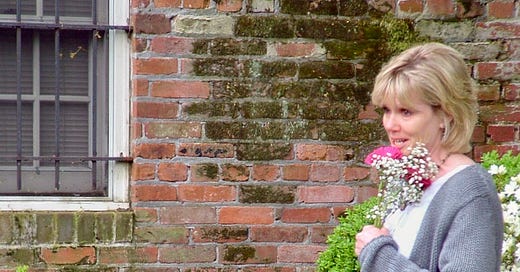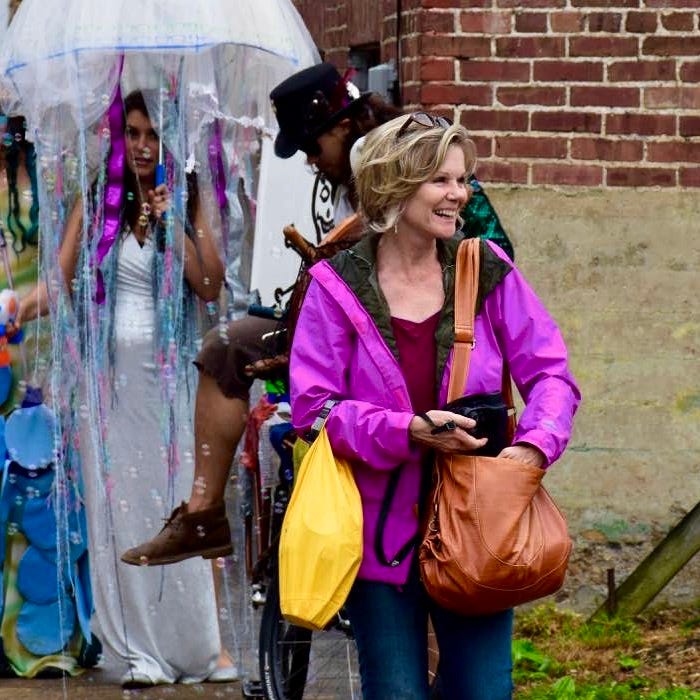Dad’s memorial service was held at Oak Hill Cemetery, adjacent to Dumbarton Oaks in Upper Georgetown. It’s where the Fellows family plot is; his father, mother and sister are all buried there.
It was Dad’s idea that we plan everything in advance together; he wanted to see how it would unfold, at least in his mind. And so, a few months before he died, we spent an afternoon driving around Georgetown, looking at the house he grew up in and stopping in to arrange renting a room at the Old Europe restaurant where the grieving would gather for food and drinks after his service.
It occurred to me how fabulous it might be to have a New Orleans style “second line” musical procession winding its way through the streets in celebration of Dad’s life. A longtime fan of Louis Armstrong and Ella Fitzgerald, Dad loved the idea. Perhaps I could get away with it, I thought, if I pulled a film permit. I even spoke with my friend Richard Chisolm about filming it so it would look like a legitimate shoot.
After our day out, I returned Dad to the Old Soldiers Home and, as usual, we stopped in at the lounge for an end-of-the-visit conversation and drink – the customary dry martini for him and a coke for me, along with grilled cheeses with chips and a pickle, our favorite.
In between sips of martinis, as we went back through the day’s details and double-checked that I’d done everything he’d wanted, I saw an uncharacteristically wistful look come over his aging face.
“Are you okay, Dad?” I asked. “Is it too sad to make these plans?”
“No,” he said. “It’s all so great, exactly how I envisioned it. I just want to be there, too!”
I remember it rained slightly that day, misted really, as if weather were tears….
On the day of the memorial, everything went as planned. In the end, I didn’t pull off the second line. Instead, I chose a young saxophonist to play some of Dad’s favorite songs by the side of the grave; mourners were able to follow the sound of his music as they made their way from the gates of the cemetery along the paths to the interment site.
I brought Dad’s wooden rocking chair over to Old Europe and set it up in the corner of the room. Everyone who knew him, knew that rocker – and seeing it empty, without Dad in it, made a quiet statement. Friends, family and work colleagues came from as far away as California. Drinks were had, stories and memories exchanged. Dad was right, he would have loved it.
Stephen came for the service and took photographs for me. Looking at them later, in almost every photograph, there is an immaculately dressed man, perhaps in his mid-fifties, with closely cropped graying hair, wearing a dark suit and standing either by my side or just behind me. There was a dark umbrella in his hands, sometimes open, sometimes furled – depending upon the amount of precipitation. That was Joseph Pozell. Joe and his wife, Ella, were the caretakers of Oak Hill and had helped me with all the arrangements. I can’t imagine it’s an easy job, but together they struck the perfect balance – caring, thoughtful, and compassionate.
In all photographs, Joe stands like a guardian angel watching over me.
Joe was also a volunteer Metropolitan police officer. His regular beat was directing traffic at the intersection of Wisconsin Avenue and M Street in Georgetown, just steps away from where I had my first post-college job working for an importer of Danish and Italian furniture and textiles. Three weeks after Dad’s memorial, while directing traffic Joe accidentally stepped into the path of an oncoming car that, for some reason, he didn’t see.
And so it was that just a month after Dad’s service, hundreds of uniformed officers saluted as Joe’s coffin was carried into Washington National Cathedral, a place filled with so many memories for me, now filled with more than a thousand mourners for Joe. He was there when I needed him most, at my father’s funeral. And then, he was gone.
Dad was a lifelong keeper of letters – letters he received, as well as copies of letters he’d sent throughout his career. I keep the professional ones in a binder in chronological order. Together, they form an interesting memoir of the people and places connected to him.
Like my father, I’ve also kept nearly all the letters I’ve ever received. After he died, I hit upon the idea of keeping the ones he’d written to me in vintage cigar boxes. He’d smoked cigars for years – until his first heart attack put an end to that – and I’ve always associated the scent of a cigar with him. It seemed an appropriate and sensually rich solution.
Although by now they had been long divorced, my parents had stayed in touch with one another, if lightly. My mother used to say the two best decisions in her life were 1) marrying my father, and 2) leaving him – which never failed to irritate the crap out of me each time she said it. It was, after all, my father she was talking about. Even though she was witness to how difficult this time had been for me – juggling kids, work, income and caring for him – she did not help with Dad’s care during his last years, nor did she come to the interment of ashes at the cemetery.
A few days after the service, I received a card in the mail from her. On the cover was a painting by one of our favorite artists, Marc Chagall, “Flowers and Bird.”
Inside, the printed message said simply, Peace.
[Photo of me, Dad’s brother Frank, my Ethiopian cousin, Alba, and the angel with an umbrella, captured by Stephen Ames]
[Photo of Kristin at top by Stephen Ames]
Kristin Fellows is a published writer, world traveler, and a well-seasoned documentary film consultant. When not writing, Kristin can often be found listening to someone’s story or behind the lens of one of her cameras.
More about Kristin @ kristinfellowswriter.com







There is definitely something in the Lundegaard genes...
There's a lot to admire, but we're quirky for sure.
That's beautiful, Kristin.